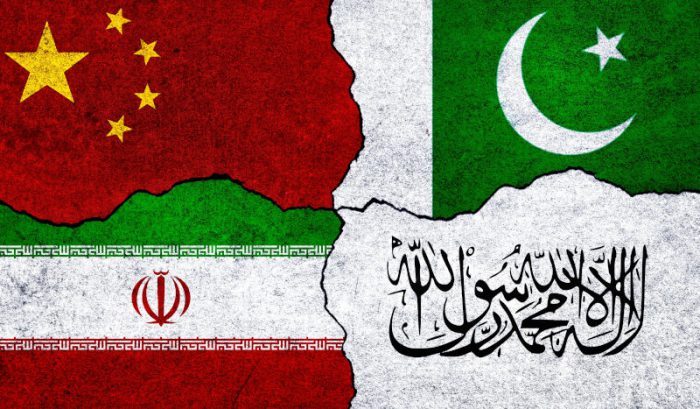Could Pakistan align itself with Iran’s bloc and potentially join what some might label a modern “Axis of Evil”? Opinion.
Iran’s Supreme Leader, Ayatollah Ali Khamenei, has ignited a geopolitical firestorm with his recent call for “effective, joint efforts” between Iran and Pakistan against Israel. His message, shared via X (formerly Twitter), praised Pakistan’s consistent stance on the Palestinian Arab issue and called for Muslim unity to halt “the Zionist regime’s crimes in Gaza.”
This bold declaration has sparked feverish speculation: could Pakistan align itself with Iran’s bloc and potentially join what some might label a modern “Axis of Evil”?
Khamenei’s statements, while not entirely unprecedented in tone, hit at a particularly volatile moment. The war in Gaza has drawn international criticism of Israel, while anti-Israel sentiment has surged across the Muslim world. Pakistan, traditionally a vocal supporter of the Palestinian Arab cause, has never officially recognized Israel. Khamenei’s message highlighted this, praising Pakistan’s refusal to bow to inducements for normalization with Israel.
But now, Iran is pushing for more than verbal support — it’s calling for strategic, actionable collaboration.
This overture comes against the backdrop of a complex and often tense Iran-Pakistan relationship. While both nations share deep cultural and religious ties, recent history has been fraught. Just last year, cross-border strikes between the two countries in Balochistan and Sistan-Baluchestan provinces sparked fears of a broader conflict. These hostilities were eventually tempered by high-level diplomatic engagements, but the scars remain. Against this backdrop, Khamenei’s call isn’t merely an appeal for unity; it’s a calculated move to pull Pakistan closer into Iran’s geopolitical orbit.
The potential implications are staggering. Iran leads what’s known as the “Axis of Resistance,” a network of state and non-state actors including Hezbollah and Hamas, aimed at destroying Israel and countering Western influence in the region. Should Pakistan shift its posture and align more closely with Iran, it would signal a seismic shift in South Asia’s strategic landscape. The label “Axis of Evil,” though a relic from George W. Bush’s era, could see new life in the media if Pakistan is perceived to be sliding toward this alliance.
Pakistan’s leadership, however, is no stranger to balancing acts. Its foreign policy has long been a masterclass in strategic ambiguity, maintaining relations with both the West and Muslim nations, threading the needle between Saudi Arabia and Iran, and carefully navigating its historic antagonism with India. While its public statements have always supported “Palestine”, Islamabad has steered clear of actions that would directly antagonize Western allies or destabilize its vital relationships with Gulf states, particularly Saudi Arabia and the UAE.
Yet, there are reasons why Khamenei’s call might find a receptive audience in Islamabad. Domestically, pro-Palestinian Arab sentiment runs deep. The images from Gaza have galvanized public opinion, with rallies, protests, and calls for stronger action against Israel. A decisive shift in policy could be framed as a moral and Islamic duty, winning points with a population increasingly disillusioned with what it sees as Western double standards.
Moreover, Pakistan’s economy is in dire straits. With inflation surging, foreign reserves dwindling, and external debt piling up, the prospect of closer economic ties with Iran — especially in energy — might be tempting. Pakistan’s need for affordable energy is acute, and Iran’s vast oil and gas resources, currently underutilized due to sanctions, could offer a lifeline. Closer ties with Tehran might also open avenues for new trade routes, bypassing chokepoints dominated by rival powers.
However, the risks are as profound as the opportunities. Aligning with Iran could provoke a backlash from the U.S. and European powers, inviting sanctions that Pakistan’s fragile economy can ill afford. It could alienate Saudi Arabia and the UAE, key sources of financial aid and remittances, and threaten Pakistan’s delicate internal balance, exacerbating sectarian tensions in a country with its own Sunni-Shia divides. Furthermore, it could drag Pakistan into conflicts far from its borders, from Gaza to Lebanon, in a scenario reminiscent of Cold War proxy wars.
The timing of this development couldn’t be more dramatic. As the war in Gaza intensifies and the Middle East is reshaped by new alliances, a Pakistani pivot toward Iran would have global repercussions. It would embolden Iran’s Axis of Resistance, unsettle Gulf nations, and force Washington and its allies to recalibrate their strategies in both the Middle East and South Asia.
Adding to the regional complexities, President Donald Trump has reportedly cautioned Israel against any military strikes on Iran, highlighting diverse international pressures regarding potential escalation
Amine Ayoub, a fellow at the Middle East Forum, is a policy analyst and writer based in Morocco. Follow him on X: @amineayoubx





